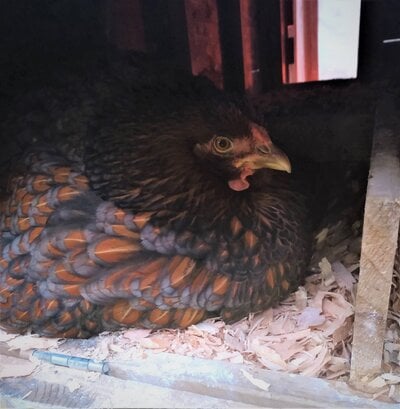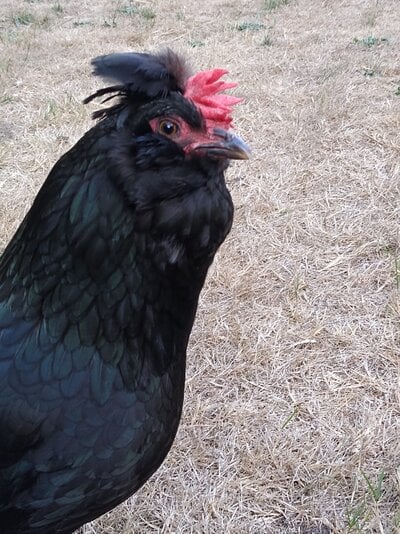Every experienced chicken owner knows that their birds have a large (and sometimes funny!) vocabulary that allows them to communicate with the flock. From a cock-a-doodle-do to the squawk of a broody hen, chickens always seem to have the right word to describe what they are feeling.
A hen may have announced that she just laid an egg, and the whole coop is quickly filled with sounds of joy. Or perhaps someone complains because she got pecked on the head by her sister. But what about other sounds, the ones that are softer or more obscure? Or the little, seemingly random noises that are heard, but not understood?
With so many different sounds, it can sometimes be difficult to figure out what they mean. After raising chickens for many years, I have come to understand the meaning behind some of their different sounds. In this article, I will share those discoveries, and I will also provide some tips for learning this fascinating language on your own.
Various Sounds and Their Meanings
Here are some sounds I have observed and collected, and their meanings as I interpret them (of course, if you have heard the same sound and believe it means something different, let me know).
The Crow
While this is probably the most well-known sound that a chicken could make, I thought I would add it anyway. I don't think that the rooster's crow means one particular thing, but it does seem that he uses it to announce his presence, or maybe his dominance. I have noticed that when I walk near the coop at night, the roosters will crow even though they cannot see me.Here are two examples of the crow:
https://whyp.it/tracks/44401/crow1?token=GRIeY
https://whyp.it/tracks/44399/crow2?token=YT5i4
Broody / Laying Egg

Like the crow, this doesn’t take too much observation before you realize what is going on, but I think it is still worth adding. For a new chicken owner, it may be surprising to open the nest box and get squawked at, but it just means the hen is either broody or laying an egg.
If the hen is broody, she will most likely stay in the nest box all day and will go back in if you try to take her out. She will squawk at anyone (human, chicken, or otherwise) that gets too close because she wants to protect her eggs from any potential threats. Paired with the squawk is the raising of the feathers on the back and neck.
While I don't have a broody at the moment, here is an example of a hen who is laying an egg:
https://whyp.it/tracks/44400/broody?token=6fJ6u
The Food Cluck
When one of my hens hatched some babies, I noticed something strange. She seemed to just pick up food and drop it again, all while making a funny noise. It was a high-pitched but soft cluck that she would repeat over and over while she was near the food.
I was worried because she was already so light after being broody for a month, and it didn’t seem like she was eating anything. It looked like she was struggling to get it into her beak, but that actually was not the case. I discovered this months later when I heard the same sound from the roosters.
I didn’t get it at first, but then I noticed that they would pick up food and drop it off to get the attention of a hen, who would then eat it. It suddenly made sense. My broody hen was trying to feed her babies and alert them of food, she was not actually trying to eat.
Roosters do the same thing for their hens. They will find something that looks tasty and then call out to the ladies to let them know (who knew roosters were so polite?).
This is the food cluck:
https://whyp.it/tracks/44406/foodcluck?token=aXV8p
The Danger Cluck
This is the sound that both hens and roosters make when they are startled and want to alert the flock of potential danger. They make it when there is a sudden loud sound, or maybe a bird flying overhead.
The sound is usually three or four short, abrupt clucks in quick succession. Sometimes, they will all head for cover if they think there is a threat. If you want to hear this, you can try whistling or clapping, but I would refrain from doing it too many times so they don’t get stressed.
It is very interesting to hear this because one sound can trigger such a big response from the flock. It shows how they must be aware at all times, always paying attention to what is going on around them.
This is a hen doing the danger cluck:
https://whyp.it/tracks/44404/dangercluck?token=o9u3x
Egg Music
Every chicken owner has heard this at some point! The telltale sign is when one hen starts making a ruckus, usually while standing in or near the coop, and one by one, everyone else joins in.
Some chickens will be clucking in a similar way, but others will be saying something completely different, and it kind of sounds like a band with all the different parts and rhythms. They usually do this just before or right after a hen lays, and it is often in the morning or early afternoon.
However, I have also noticed that one or all of them will start clucking and squawking at other random times when it doesn’t seem that anyone has laid an egg, so I wonder if it could also be just random excited conversation.
This is an example of one of my hens announcing that she just laid an egg (I don't have an example of the entire flock doing it, but I will update this once I do):
https://whyp.it/tracks/44405/eggmusic?token=eIQXc
Here is a rooster doing something similar to egg music (he obviously did not lay an egg, though):
https://whyp.it/tracks/44408/rooster?token=hmMQl
The Funny Rooster Sound
I don’t know exactly what to call this. When one rooster does it, it sounds like a soft purr or growl, and sometimes both of them do it, usually a couple of times in response to each other, and it gets very loud (and very hilarious).
While I haven't quite figured out what this means, it seems like it could be another type of warning, but less urgent than the danger cluck. I have watched my rooster do it a few times as he looks at the sky like he is carefully watching a dangerous-looking bird or some other possible threat.
However, sometimes both roosters will do it and it doesn’t seem connected to danger. (If anyone has any ideas, let me know).
This is one rooster making the sound (the quality is not the best. Again, I will update if I get a better example):
https://whyp.it/tracks/44407/funnyroostersound?token=xH1vO
Three Tips to Become Fluent
1. Observe Your Flock
You can learn a lot about your chickens when you simply sit back and watch. While it is both relaxing and entertaining (chicken TV, anyone?), just observing your chickens without offering distraction gives you the opportunity to see your birds in their natural state when they aren’t seeking food or attention.However, if you pull up a chair and suddenly every chicken and their mother appears around your feet, don’t fret. Just sit patiently, and once they realize that you don’t have food, they will get bored and wander off, proceeding to ignore you just as desired.
Once you have a good seat for the show, observe your chickens. Listen to the sounds they make, and watch what they are doing when they make those sounds.
Did a rooster find a juicy bug that he wants to share with his ladies? Did a hen find an even juicier bug that she most definitely does not want to share? Did a bird fly overhead, triggering an alarm that echoes through the flock, causing them to run for cover?
Look for the details that go with the sounds, and your flock’s seemingly foreign language will begin to make a little bit more sense.
2. Interact with Your Flock
While quiet observation is very helpful, you will also learn a lot by interacting with your chickens. Just like humans, it seems that chickens will change their mannerisms slightly depending on who they are interacting with.For example, one of my hens is very bossy and slightly ornery around other hens, but when she sees a human, she can’t resist coming over for a quick conversation! While she does talk to the other hens, it is different than the way she talks to humans.
This is why it will be helpful to observe your flock from a distance, and then see what changes when you interact with them personally. If you do notice a difference in what your chickens are saying, pay attention to what you are doing, and see if you can make connections to the other observations you’ve made.
I solidified my understanding of what the ‘danger cluck’ meant by doing this – and it was an accident, too! When I was out with my chickens one day, I whistled, and my rooster set off the danger alarm. I tried it a few more times (only a few – I didn’t want to stress him out too much), and I got a consistent response each time.
While I thought I knew what the ‘danger cluck’ meant for a pretty long time, this really proved it! So, go interact with your chickens! Maybe try making different sounds to see how they respond. Talk to them and notice how they talk to you. This brings me to the last tip which is…
3. Give Them Treats!
There is really no better way to get the chatter going than throwing something tasty on the ground for your flock to gobble up. When they are eating, things sometimes get a little competitive.It’s not uncommon to witness a hen snatching food from another’s beak or getting a quick peck on the head when she eyed someone else’s morsel a little too closely. Adding food to the mix of observation and personal interaction creates yet another environment in which you can observe different behaviors, and therefore, hear new sounds.
As I mentioned earlier, I learned what the ‘food cluck’ meant after watching my roosters feed their hens. I heard the same sound when I had a broody hen, but I only connected the two when I heard the roosters make it a few months later.
Now that I know what it means, I have noticed that the hens will go running toward the rooster when he makes that sound. This is why it is important to listen to and observe their behavior, even if you are not sure what it means at the moment.
After spending a lot of time with your flock, you will make connections between what you have seen in the past, and you will gain a deeper understanding of your birds and how they communicate.
Conclusion
If all these tips seem similar, it is because there really is only one way to become fluent in your chickens’ language: spend more time with your flock! This might be obvious, but it is the best way to learn what they are saying, just like one of the most effective ways to learn any language is to spend a lot of time around people who speak it. So, if you get out there and observe your chickens in different situations or environments, and listen to their different sounds while making connections about their behavior, I guarantee that you will add a word or two to your ever-growing vocabulary!
Here is an article that shares an interesting perspective on egg music:
https://www.backyardchickens.com/articles/the-egg-song-it’s-not-about-the-egg-it’s-an-escort-call.74386/




